 History
History  History
History  Weird Stuff
Weird Stuff 10 Wacky Conspiracy Theories You Will Need to Sit Down For
 Movies and TV
Movies and TV 10 Weird Ways That TV Shows Were Censored
 Our World
Our World 10 Places with Geological Features That Shouldn’t Exist
 Crime
Crime 10 Dark Details of the “Bodies in the Barrels” Murders
 Animals
Animals The Animal Kingdom’s 10 Greatest Dance Moves
 Movies and TV
Movies and TV 10 Box Office Bombs That We Should Have Predicted in 2025
 History
History 10 Extreme Laws That Tried to Engineer Society
 History
History 10 “Modern” Problems with Surprising Historical Analogs
 Health
Health 10 Everyday Activities That Secretly Alter Consciousness
 History
History 10 Dirty Government Secrets Revealed by Declassified Files
 Weird Stuff
Weird Stuff 10 Wacky Conspiracy Theories You Will Need to Sit Down For
 Movies and TV
Movies and TV 10 Weird Ways That TV Shows Were Censored
Who's Behind Listverse?

Jamie Frater
Head Editor
Jamie founded Listverse due to an insatiable desire to share fascinating, obscure, and bizarre facts. He has been a guest speaker on numerous national radio and television stations and is a five time published author.
More About Us Our World
Our World 10 Places with Geological Features That Shouldn’t Exist
 Crime
Crime 10 Dark Details of the “Bodies in the Barrels” Murders
 Animals
Animals The Animal Kingdom’s 10 Greatest Dance Moves
 Movies and TV
Movies and TV 10 Box Office Bombs That We Should Have Predicted in 2025
 History
History 10 Extreme Laws That Tried to Engineer Society
 History
History 10 “Modern” Problems with Surprising Historical Analogs
 Health
Health 10 Everyday Activities That Secretly Alter Consciousness
10 Unbelievable Things We Have Made Out Of Cats
The idea of making something out of a cat probably sounds weird because cats are pets and not some random nonliving item that can be easily exploited. Well! That does not apply to everyone. Some people consider cats as just another tool to achieve their goals—ethics be damned.
Although Americans do a good job of keeping our furry friends as pets, others elsewhere think that these animals are just another source of protein. Cats have also been used to make all sorts of unconventional and unbelievable things, including telephones, drones, pianos, and even spy gadgets.
10 A Telephone
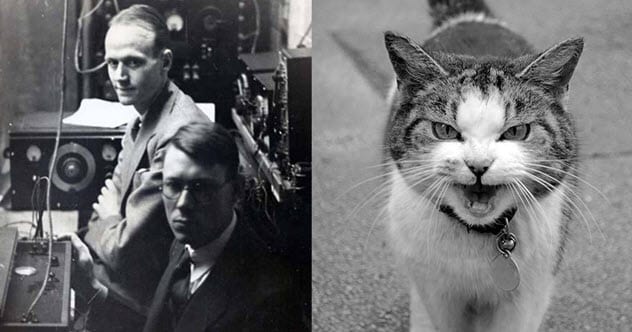
In 1929, Professor Ernest Glen Wever and Charles William Bray, two Princeton University scientists, made a telephone out of a cat.
Wever and Bray rendered the cat unconscious with sedatives before opening its skull to reach the auditory nerve. They attached one end of a telephone wire to the nerve and the other end of the wire to a telephone receiver 15 meters (50 ft) away. Then Bray started to talk into the cat’s ears while Wever listened at the telephone receiver.
The two men were more interested in experimenting with the auditory nerve than creating a practical telephone out of a cat. Before the experiment, scientists thought that the sound of voices increased in frequency when they hit the auditory nerve. However, the experiment revealed that voices remained at the same frequency as they collided with the nerve.[1]
Wever and Bray also discovered that the cat telephone did not work when they put one end of the wire in other tissues and nerves apart from the auditory nerve. The telephone also malfunctioned when they stopped blood flow to the cat’s head, even though the wire was connected to the auditory nerve. The experiment was crucial in the creation of cochlear implants for deaf people.
9 A Piano
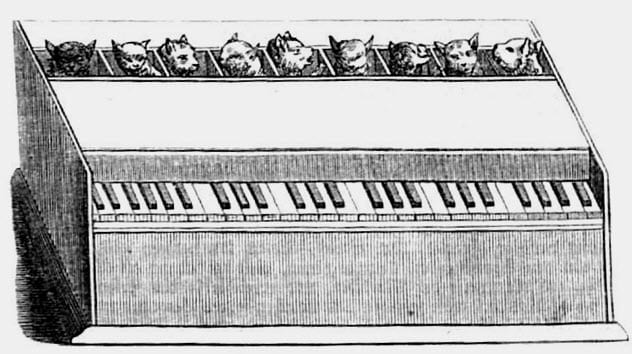
The katzenklavier (“cat organ”) is a piano like no other. It is made from real cats. Athanasius Kircher gave details about making one in his 1650 music book, Musurgia Universalis.
Kircher wrote that the piano required several cats that made meow sounds of different pitches. The cats were put in small cages at one end of the piano. Their tails were connected to some mechanism that delivered a spike into the tail of a cat whenever the player pressed a corresponding button.
The pain of the spike caused the cat to meow. The player composed music by pressing different buttons to make different felines meow. Kircher added that the meows got louder with subsequent presses as the cats became determined to escape from the piano.[2]
Although there is no evidence that someone ever made a cat organ using details from Kircher’s book, there are claims that one was played as King Phillip II rode into Brussels sometime in the 16th century—a full century before Kircher proposed his piano. Historian Juan Calvete de Estrella wrote that the piano was played by a bear on a chariot.
8 A Drone
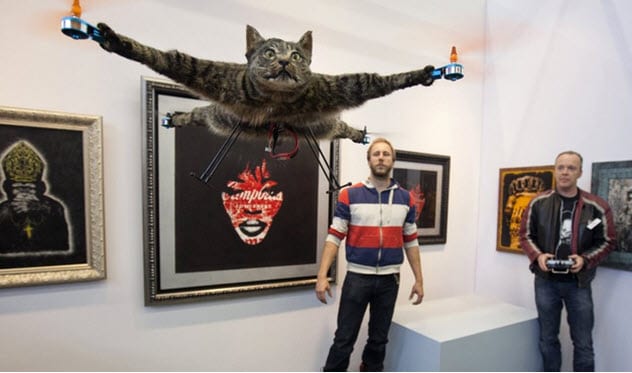
Drones have been taking over our skies lately. Maybe that was why Bart Jansen decided to make one out of his cat after it was hit by a car in 2012. Jansen was so distraught by the death of his cat, Orville, that he wanted a way to immortalize his pet.
Jansen decided to turn Orville into a drone because the animal had shared a name with Orville Wright, one of the two inventors of the first successful airplane. Jansen worked with engineer Arjen Beltman, who managed the electrical and mechanical parts of the project.
The result was a remote-controlled quadcopter drone he called the Orvillecopter. It resembled a regular quadcopter with the skin of Orville spread over it.[3]
Jansen and Arjen later went on to fashion quadcopter drones out of a rat and an ostrich. They also added a jet engine to a dead shark and made a submarine out of a badger. The duo is currently trying to build a quadcopter that could fit a man. It would be made from a cow.
7 A Purse
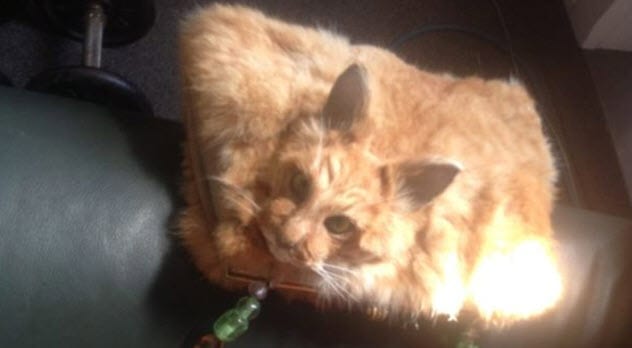
In 2016, New Zealand taxidermist Claire Third made the news after putting a purse she had fashioned from a dead cat up for auction. The purse included the head and skin of the dead feline in case you are wondering.
Third found the cat by the roadside where it had been squashed to death by a passing vehicle. She took it home and made it into a purse that she put up for auction at NZ$1,400. The auction generated mixed reactions. Some liked the product, while others accused her of making money off a dead cat.[4]
Someone suggested that she leave the cat alone. Another asked if she thought it would be okay if someone shot and stuffed her. Others just made jokes. One asked, “Who let the cat out the bag, or is it inside out?” Third reduced her asking price to NZ$1 but sold the purse for NZ$545.
6 Food
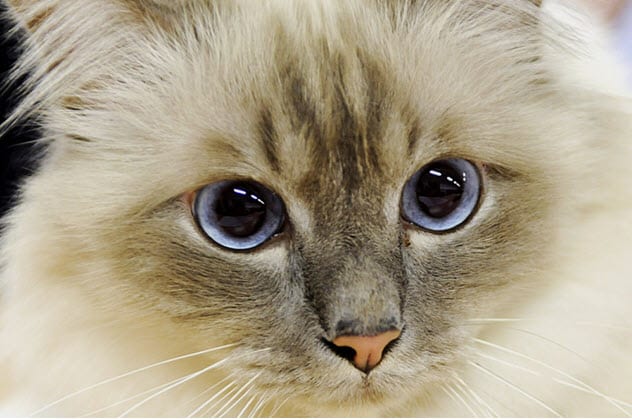
Americans might become disgusted at the thought of eating a cat, but in Vietnam, these animals are just another source of meat. Vietnamese cat meat lovers call them “little tigers.” They are sold at restaurants where consumers eat them with beer.
Little tigers are sometimes prepared in inhumane conditions. Restaurants drown the cats in water before shaving their skin and burning them to remove leftover fur. Then the restaurant workers cut the animals into bits and fry them.
The Vietnamese continue to eat cats even though a government ban restricts restaurants from killing and selling cats over concerns that the rat population could explode. The Vietnamese consume so many little tigers that there is a shortage of cats to make the delicacy. These days, thieves prowl the streets to steal cats to sell to restaurants. Vendors also smuggle the cats from nearby Thailand and Laos.
Interestingly, the Vietnamese do not have a history of eating cats. They only started consuming cats, rats, and dogs after suffering a series of devastating wars and famines in the 20th century. While the nation is much more stable today, people have just become used to eating cats and it will take more than a government ban to stop them.[5]
5 A Spy Gadget
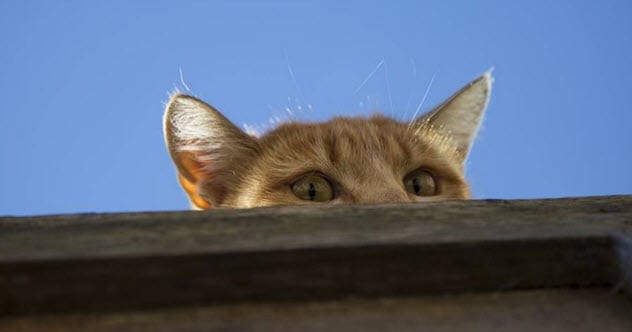
Operation Acoustic Kitty was the CIA’s elaborate attempt to make a spy gadget out of a cat. The idea was to rig cats with audio surveillance systems and have them play around foreign agents in the hopes that the animals would pick up one or two secrets.
The project started with a single cat called Acoustic Kitty. It underwent surgery to have a microphone installed in its ear and a radio transmitter placed at the base of its skull. An antenna was also installed under its fur.
Agents took the cat to a park where they tested it around two random men sitting on a bench. The cat did not walk toward the men. Instead, it sauntered right into the middle of the street where a taxi ran over it. The CIA later released a memo saying that cats do not make good trainees.[6]
4 Defensive Weapons

Cats clearly do not make good shields because they are just too small and always wander off in the opposite direction of wherever they are needed. However, they can become valuable defensive weapons when used against the beliefs of an enemy, just as the Persians did in the 525 BC Battle of Pelusium against Egypt.
Egypt and the Persian-ruled Achaemenid Empire went to war after Pharaoh Amasis II delivered another woman in place of his daughter to Achaemenid emperor Cambyses II for marriage. The pharaoh refused to give away his daughter over concerns that Emperor Cambyses II would turn her into a concubine instead of a wife.
Amasis was dead by the time the Persian army reached his border. His son Psametik III (or Psammenitus) was pharaoh. The Persians arrived with lots of cats, which they knew that the Egyptians revered and would never kill. The Egyptians were unable to deploy their arrows against the Persians over concerns that they would hurt the cats.
Other accounts say that the Persians did not use live cats but drew images of a cat-headed goddess called Bastet on their shields. Whichever was true, all sources agree that the Egyptian army was heavily defeated. There were so many casualties that the ancient Greek historian Herodotus still found remnants of dead soldiers when he visited the battlefield 75 years later.[7]
3 Offensive Weapons
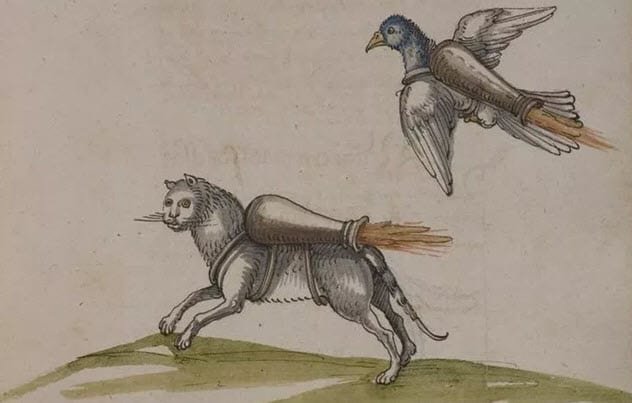
In 1584, someone in Germany published a manuscript, Feuer Buech, detailing the creation of some siege weapons. It included an incendiary weapon made from burning pigeons and cats.
The unidentified author suggested that armies stole cats that lived around castles or city walls they planned to attack. During the attack, the army would strap explosive-filled bags to the backs of the cats and set them on fire. The cats instinctively fled back home to hide, burning whatever stood in their way.[8]
There is no evidence that the German military ever produced or used that sort of weapon. However, there are accounts that burning cats were used as weapons as early as the third century BC. There are also claims that the infamous Mongol ruler, Genghis Khan, used them during his bloody campaigns.
2 Black Diamonds

Losing a pet can be painful. However, some people are turning their animals into diamonds to remain with their beloved pets forever. Human and animals can be turned into diamonds because our bodies contain substantial amounts of carbon. Diamonds are also made of carbon.
Pets and humans often end up as white diamonds. However, one business managed to create a black diamond from a cat called Sooty.
In 2008, the BBC reported that one Sue Rogers had turned her dead cat into a one-third carat black diamond. The gem was the only black diamond ever made from ashes at the time. The manufacturer, LifeGem, made the diamond using two grams of carbon from the cremated remains of the dead cat.[9]
They first made the diamond using the regular method. That is, they exposed the ashes to a very high temperature and pressure for two weeks. The resultant diamond was white and only turned black after it was exposed to electrons for a day.
1 Drug Mules

Incarcerated criminals in Russia and Brazil have been turning cats into unwilling smugglers. In 2015, officials arrested a cat outside the Presidio Regional Romero Nobrega prison in Patos, Brazil, after a failed smuggling attempt.
Officials discovered the smugglers had used gauze, plaster, and masking tape to strap mobile phones, chargers, and SIM cards to the cat’s body before covering it with fake fur. Prison officials discovered the plot after spotting plaster on the body of the cat. Later, they said that they would check every cat entering and leaving the prison from then on.
In another incident, two people were arrested after a cat tried smuggling hashish and amphetamines into a Russian prison in 2018. Police said that the cat had lived in the prison until one of the inmates took it home after his release. The suspects had brought the cat near the prison at the time they were arrested.[10]
Read more weird facts about cats on 10 Weird Ways Cats Have Been Venerated Through History and 10 Weird Facts About Cats.








